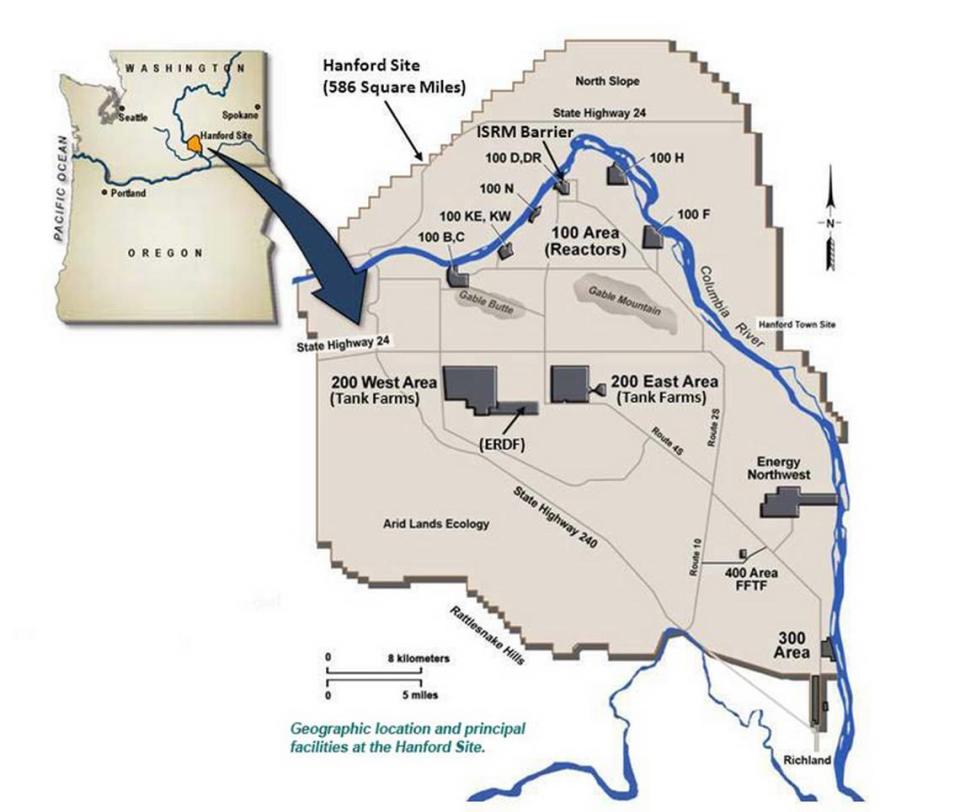Tri-Cities works to fend off another Biden administration snub to pay for schools, roads
After the Biden administration tried to zero out millions of dollars in Hanford payments to Tri-Cities area local governments this year, the fight has started to get money included in the upcoming federal budget proposal.
For nearly three decades the federal government has made payments in lieu of taxes — or PILT — to help make up for taking the 580 square miles of the Hanford site off the property tax rolls to help pay for local government services in Benton, Franklin and Grant counties in Eastern Washington.
PILT money is used for roads, rural libraries, ports, public hospital and other health services, and help for indigent veterans. But the largest chunk goes to schools.
Benton County, which is home to most of the Hanford nuclear reservation, received about $3.8 million in PILT in 2021, with about $1.7 million going to the Richland School District.
But last year the budget the administration proposed to Congress included no money for PILT for Hanford or the Savannah River, S.C., site, but it included payments for communities near other, much smaller Department of Energy sites.
The money was restored to the budget, thanks to work by Sens. Patty Murray and Maria Cantwell, D-Wash., and Rep. Dan Newhouse, R-Wash.
Since Congress has yet to approve a budget for the current fiscal year, the payments continue as funding remains at the same level for the previous fiscal year.
But local government leaders remain baffled about the snub by the administration last year and want to make sure there is not a repeat as the Biden administration is preparing to release its budget proposal for Hanford for fiscal 2023.
“It is a signal of how they do or do not value communities around the site,” said David Reeploeg, vice president for federal programs for the Tri-City Development Council (TRIDEC).

During World War II, the federal government seized land from farmers, business owners and homeowners, to make plutonium for the nation’s nuclear weapons program at the Hanford nuclear reservation.
Plutonium production continued through the Cold War and now the federal government is spending about $2.5 billion a year on environmental cleanup of the site, most of which remains closed to the public.
Schools need payments
Reeploeg points out that the schools that PILT helps pay for are educating the workers that Hanford will need to continue doing cleanup work for decades to come.
Superintendents of four school districts sent a letter Thursday to Energy Secretary Jennifer Granholm also reminding DOE that the kids helped by PILT money are the children of Hanford workers.
The letter points out that continuing the PILT payments is consistent with President Biden’s commitment to environmental justice.
It was signed by the school superintendents in the Richland, North Franklin, Prosser and Paterson districts.
Hanford Communities — a coalition of Kennewick, Richland and Pasco, Benton and Franklin counties and the Port of Benton — also sent a letter to the energy secretary this week urging her support in the upcoming budget.
“PILT payments are equal to only a fraction of what private companies and employees would contribute to local tax revenues for similar land, improvements and service usage,” the letter said.
As Benton County property values have gone up over the last decade, DOE has balked at paying the full amount billed to the county and some years did not submit the full amount.
Before land was seized by the federal government in 1943, some of it was irrigated for orchards and vineyards. Part of the increase in PILT bills has been driven by the rising value of irrigated land as the Mid-Columbia becomes known for its wine grapes.

The three counties combined have received as much as $9.8 million per year in PILT, with Benton County receiving as much as $7.4 million, according to the U.S. Government Accountability Office.
Benton County responded to the federal government’s reluctance to pay its full bill starting about five years ago by reducing the bill in the hopes of more cooperation from the federal government.
The current amount billed is a small fraction of the overall Hanford budget, Reeploeg said.
Biden administration pressured
The nationwide Energy Communities Alliance, which includes Hanford Communities, also is working to get the administration to support PILT funding for the Hanford and Savannah River sites.
It is targeting the White House Office of Management and Budget and Office of Intergovernmental Affairs, requesting meetings on the issue.
“We understand that DOE supported this initiative, but that the Office of Management and Budget may have cut the funding for the sites dealing with the largest environmental cleanup projects in the country,” it said in letters to the White House Jan. 20.
It is not just the Biden administration that has been reluctant to make Hanford PILT payments.
“We have been working since 2015 with Congress, the DOE, and now three successive administrations to try to resolve this issue so that PILT for the Hanford communities can be predictable, sustainable and reliable for all parties involved,” said Shon Small, chairman of the Benton County Commission.
Having to revisit the issue each winter during budget season is “very frustrating,” he said. “Year after year this drains time and energy resources that we could be applying elsewhere.”

